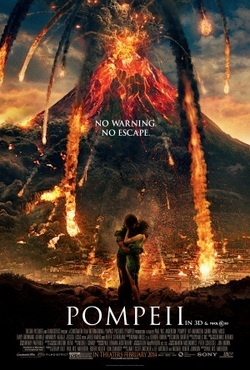 I love a disaster movie, even cheesy ones with volcanoes and bad science in them...In fact one of my favourite volcano related disaster movies (there aren't that many to choose from I know!) is Dante's Peak. What isn't there to enjoy about a volcanologist who nonchalantly waltzes and swaggers his way round or over volcanic obstacles and phenomena (even though plausibility is certainly questionable!). I suppose it also helps that this particular volcanologist is associated with roles such as James Bond, which all aids to "sex and glammer up" what the vast majority of volcanologists really do! Long story short, it was no surprise that I went to this particular movie. Being A Game Of Thrones (GoT) fan too (the lead character "Milo" is also "John Snow" in GoT) it wasn't much of a hard decision. The film, of course, revolves around the eruption of Vesuvius in AD 79. Volcanologically and historically this eruption was important for a number of reasons, including it's complete engulfment of Pompeii and other nearby settlements (e.g. Herculaneum) and the unprecedented account of the eruption by a nearby observer - Pliny the Younger. Having never read the accounts of Pliny this was one of the first things I did. Pliny recounts the eruptions in two letters to Tacitus, a prominent historian in his own right. Pliny at the tender age of 18, witnesses parts of the eruption himself and recounts other parts from sources at the time. In these letters, Pliny remarks on significant Earth tremors leading up to the eruption, which certainly were present in the film. He also makes references to the receding of the sea and a significant amount of ashfall - which eventually kills Pliny the Elder. On a side note he also gives a fantastic description of the rising of a buoyant plume. So, scientifically, what was questionable in the film or didn't occur at the time? Pliny the Younger does mention a slight recession of the sea, which certainly suggests that a Tsunami did occur, although, I have found/heard no mention of the gargantuan waves depicted in the films. Trawling the internet I tried to find whether there was a consultant volcanologist employed on the film but was unfortunately unsuccessful. As always I am a little behind trend and you can find another summary of the movie here on live science. In this overview, they also mention the volcanic bombs, their absence in any evidence and also the size of any Tsunami. It was slightly disappointing that the film didn't incorporate more of Pliny, oh well! I would certainly recommend reading the letters of Pliny in their entirety, whilst the majority are related to his doings in the senate, they really are a fantastic insight into the Roman world - there is even a Ghost story thrown in! Comments are closed.
|
Archives
July 2023
|

 RSS Feed
RSS Feed